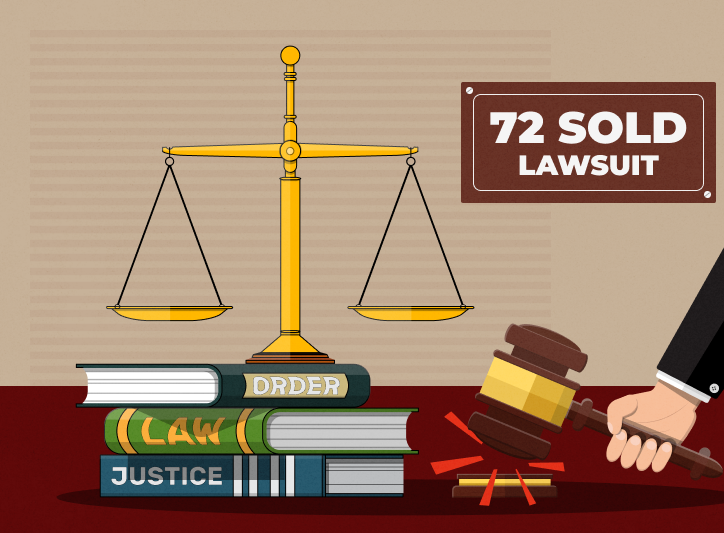The 72SOLD lawsuit shows a clear gap between what they promised and what homeowners say they got. The company says they can sell homes in just 8 days (now 11 days in 2024) and get top prices. But many sellers have taken legal action, saying the company used deceptive practices and hid their fees.
72SOLD grew into one of America’s 500 fastest-growing companies. Yet they now face tough questions about their business. Sellers claim the company misled them in ads, kept fees secret, and failed to deliver on their promises about timing and prices. Many homeowners say they struggled with money and lost faith in the company when they found out the reality was different from what ads promised[-5].
This piece gets into the lawsuit against 72SOLD and how their business model really works. We’ll look at how their Keller Williams partnership affects their service. You’ll learn what customers actually say and how trustworthy 72SOLD’s reviews are. Their claimed results dropped from 10.7% above median sale prices to 5.7% in 2025. Home sellers who want to think about their options in today’s market will find helpful alternatives here.

Table of Contents
- 1 What is 72SOLD and how does it work?
- 2 Inside the 72SOLD lawsuit: Key allegations
- 3 What real customers are saying
- 4 Legal implications and your rights as a seller
- 5 Should you use 72SOLD? Alternatives to consider
- 6 Summing all up
- 7 Here are some FAQs about the 72 sold lawsuit:
- 7.1 What is the 72 Sold lawsuit?
- 7.2 Is there really a lawsuit against 72 Sold?
- 7.3 What are the allegations in the 72 Sold lawsuit?
- 7.4 How can I verify the 72 Sold lawsuit truth?
- 7.5 Is the 72 hour sold lawsuit the same as the 72 Sold case?
- 7.6 Can I join the lawsuit against 72 Sold?
- 7.7 What should I do if I’m affected by the 72 Sold practices?
- 7.8 Where can I find updates about the 72 Sold lawsuit?
What is 72SOLD and how does it work?
Greg Hague, an Arizona-based attorney and real estate broker, started 72SOLD in 2018 as a fresh alternative to traditional home selling methods. The company first promised to sell homes in 8 days, but they’ve extended this timeline to 11 days as of 2025.
Overview of the 72SOLD model
72SOLD works like a traditional real estate brokerage but speeds up the process to create competition among buyers. Unlike companies such as Opendoor or Offerpad that buy homes directly, 72SOLD connects sellers with agents who know their specific selling program.
The numbers look promising. An independent study of 11,618 home sales showed that sellers who used their program got median prices 5.8% higher than other homes in their local MLS. The company’s earlier claims of higher percentages (7.8% and 10.9%) have dropped in their latest reports.
Sellers who work with 72SOLD go through a step-by-step process. It starts with an online valuation and home walkthrough. Their agent creates a listing strategy and puts the company’s quick-sale approach into action. The commission rate stays at market levels – 5-6% of the closing price.
Key selling tactics used
72SOLD uses several marketing tactics to create urgency and get buyers competing:
- “Coming soon” marketing: They advertise listings before they hit the MLS to build early buzz
- Limited showing window: Instead of showing homes for weeks, they pack all showings into one weekend
- Competitive pricing strategy: They might price properties below similar homes to attract multiple buyers
- Strict offer deadline: A firm deadline (usually Monday after weekend showings) creates urgency and often leads to bidding wars
- All-at-once offer review: Sellers look at all offers together to maximize their position
The model creates what Hague calls “social proof” – buyers see others interested in the property, which drives up its value and competition.
Partnership with Keller Williams
72SOLD joined forces with Keller Williams in June 2022. This partnership opened doors for about 200,000 Keller Williams agents worldwide to use the 72SOLD program. Keller Williams stands as the world’s largest real estate franchise by agent count.
The company plans to grow beyond the 38 U.S. states where it operates through roughly 500 real estate agents. Gary Keller, who co-founded Keller Williams, owns 49% of 72SOLD.
The deal works both ways. 72SOLD trains Keller Williams agents on their selling system. These agents pay a referral fee to 72SOLD, and 80% of that money goes back into marketing.
Inside the 72SOLD lawsuit: Key allegations
Homeowners nationwide have voiced major worries about 72SOLD’s business practices. These concerns have led to legal challenges that now threaten the company’s reputation. The 72SOLD lawsuit centers on multiple allegations of deceptive practices. Plaintiffs seek compensation for losses they experienced from what they describe as misleading marketing tactics.
Misleading advertising claims
Legal documents show the main complaints in the 72SOLD lawsuit involve allegedly false advertising about sale timeframes and outcomes. Plaintiffs argue that 72SOLD’s advertisements overstated success rates and left out critical conditions that limited these guarantees. The company heavily promotes its “72-hour sale” promise, but homeowners claim this guarantee only applied to properties meeting strict, undisclosed criteria like specific pricing tiers or locations.
The company faces accusations of making exaggerated claims about financial returns. Their advertised achievement of 10.7% above MLS median sale prices has dropped to just 5.7% in 2025. Critics highlight how the company’s marketing materials suggested homeowners would receive offers at or above market value. Many sellers say their homes sold for substantially less than expected.
Hidden fees and unclear commissions
Much of the customer complaints revolve around financial transparency issues. Many homeowners were caught off guard by unexpected costs that weren’t clearly explained upfront. Official complaints show these hidden fees substantially reduced sellers’ net proceeds.
Truth in Advertising (TINA.org) found that 72SOLD doesn’t clearly show its fee structure in marketing materials. The organization learned that fee information sits only on an FAQ page that regular website navigation can’t reach. This hidden information reveals that 72SOLD charges “fees at closing for your home… averaging 5%-6% of the closing price depending on the condition and saleability of your home”.
Deceptive urgency tactics
The lawsuit claims 72SOLD uses high-pressure sales tactics to rush sellers into decisions. Accusations include creating fake urgency that pushes homeowners to accept lower offers with unfavorable terms. Complaints document how this pressure stops sellers from properly understanding and comparing offers.
Complainants point out that the company uses what they call “deceptive marketing tactics” to push quick sales. The lawsuit highlights these tactics:
- Vague contractual terms allowing timeline extensions
- Limited buyer vetting leading to financing issues
- Non-refundable upfront costs even if sales fall through
Customer dissatisfaction and broken promises
The Better Business Bureau has logged many complaints about 72SOLD. These complaints mostly focus on unmet expectations. One customer said: “Upon recruitment to 72 sold I was told there would be tons of marketing/commercials beginning Sept. 1st in my area… After my trial period expiration I then am told that the marketing will not be as promised”.
Failed core promises emerge as another common theme. Customers say their homes weren’t sold within promised timeframes, which caused major stress and frustration. A dissatisfied seller shared: “Worst choice we ever made! Wasted so much time with no results. We felt like they threw our house up on MLS then abandoned us”.
72SOLD maintains there is no lawsuit against them and claims information about legal action is “100% false”. All the same, the sheer number and consistency of complaints point to real customer dissatisfaction with the company’s business practices.
What real customers are saying
72SOLD’s marketing promises and real-life outcomes show a stark difference. Their reviews tell a complicated story that needs a closer look, especially with the recent 72 sold lawsuit allegations.
Positive experiences and fast sales
Sellers who use 72SOLD often report impressive results through their quick selling process. Reviews show properties selling high above asking price, with some sellers making $40,000 to $100,000 more than their original expectations. A happy customer said: “We got $57,000 over the asking price… their system works!”. The simplified processes stand out in other reviews, with houses selling in hours or days instead of weeks.
New sellers love the well-laid-out approach. Reviews highlight how the program helps them sell without disrupting their daily life. Clients praise the 90-minute showing window because it limits stranger access to their home.
Common 72SOLD complaints
Good results aside, customer feedback reveals some recurring issues:
- Underpricing concerns: Many clients say 72SOLD agents suggest listing prices way below market value—sometimes “$80k less than the lowest priced home in our association”
- Abandoned listings: Houses that don’t sell quickly often get neglected: “We felt like they threw our house up on MLS then abandoned us”
- Unrealistic expectations: Reviews point out that 72SOLD works best in hot markets but doesn’t deal very well with cooler conditions
Market conditions, not their unique process, often determine how quickly houses sell.
Mixed reviews from realtors and clients
Realtors working with 72SOLD see things differently from their clients. Partner agents give glowing reviews, calling it “revolutionary” and “the best alternative to selling your home the traditional way”.
Client reviews tell a different story. While many clients feel happy, others wonder if the results are any different from regular selling methods. One customer pointed out: “It was basically the same as going with any other realtor. They took photos, put up the listing, and waited”.
Are 72SOLD reviews trustworthy?
72SOLD’s 4.9-star Google rating from 2,130 reviews raises some questions. Experts note that “over 50% of reviews are from 72SOLD’s realtor partners, not their actual customers”. The CEO asks affiliated agents to leave positive reviews, which inflates their ratings.
Real Estate Witch warns that “when an agent buys into the program, they are encouraged by CEO Mark Hague to leave a 5-star review”. This makes it hard to see how satisfied real customers are. Former partners on Reddit admit they were “relentlessly prodded” to leave glowing reviews.
You need to look beyond the ratings and check who wrote the reviews to understand what it’s really like to work with 72SOLD.
Legal implications and your rights as a seller
Legal rights knowledge is vital when dealing with potential problems in real estate services like 72SOLD. The 72 sold lawsuit shows how sellers must recognize marketing practices that cross legal lines and understand their available options.
Consumer protection laws that apply
The Deceptive Trade Practices-Consumer Protection Act (DTPA) gives consumers strong legal protection against deceptive practices in real estate deals. This act clearly states that “false, misleading, or deceptive acts or practices in the conduct of any trade or business are hereby declared unlawful”. The law classifies residential real estate as a tangible consumer good, which means buyers get protection under these laws.
The Federal Trade Commission (FTC) leads federal investigations into fraudulent business practices, including real estate scams. State laws also require sellers to provide Seller’s Disclosure Statements before accepting offers. Dishonesty in these disclosures could make sales illegal.
What counts as deceptive marketing
Deceptive marketing in real estate covers several practices that might apply to the 72 sold lawsuit claims:
- Misrepresenting services’ characteristics or quality
- Advertising without intent to sell as advertised
- Hiding information to influence consumer purchases
- Using false urgency or pressure tactics
Consumer protection laws shield even uninformed buyers: “An act is false, misleading, or deceptive if it has the capacity to deceive an average or ordinary person, even though that person may be ignorant, unthinking, or credulous”. Penalties for misleading conduct in 2024 have reached new heights—companies now face fines up to $50 million, triple the benefit received, or 30% of adjusted turnover (whichever is greater).
How to file a complaint or take legal action
People affected by 72SOLD’s alleged deceptive practices have several legal options:
- File complaints with regulatory bodies: Contact your local consumer protection agency or the Better Business Bureau (BBB) to document issues.
- Consider class action participation: Class action lawsuits could bring compensation to affected sellers. Recent real estate commission settlements reached $44 million for people who sold homes between 2019-2025.
- Consult a specialized attorney: Real estate legal experts can assess your case and suggest the best course of action.
The law requires you to give written notice to the person at least 60 days before filing a lawsuit. This notice should detail specific complaints and economic damages. Your state’s real estate regulatory board should be your contact point if 72SOLD lacks proper licensing as a brokerage in your state (like in Colorado).
Should you use 72SOLD? Alternatives to consider
The recent lawsuit against 72SOLD has raised questions among potential users. You just need to think about several factors to determine if their service matches your requirements.
When 72SOLD might work for you
We tested 72SOLD’s strategy, and it works best for sellers in competitive markets where buyer demand runs high. Their approach could benefit you if your home is in good condition and you want a quick sale (though not immediate closing). The company creates buyer competition through condensed viewing windows and deadline-driven offers. This approach can generate higher bids in hot markets.
Low-commission real estate options
72SOLD fees typically run 5-6% of closing price. Here are some money-saving alternatives:
- Clever Real Estate: Offers 1.5% listing fees with full service
- Redfin: Charges 1.5% commission, reduced to 1% when buying and selling through them
- Ideal Agent: Provides 2% commission with vetted agents
These options can put thousands back in your pocket. A $500,000 home sale with 1.5% commission instead of 3% saves you $7,500.

Cash buyer companies vs. 72SOLD
Cash buyers guarantee quick closings (1-3 weeks), which sets them apart from 72SOLD. iBuyers like Opendoor come closer to market values than traditional cash buyers. 72SOLD takes a different approach that focuses on getting full market value through competition rather than discounted cash offers.
Questions to ask before signing a contract
- What’s the exact commission structure and are there additional fees?
- How long am I locked into the listing agreement? (72SOLD’s contracts often bind sellers for 90 days)
- What happens if my home doesn’t sell during the original period?
- How will my home be marketed beyond the initial push?
Summing all up
The 72SOLD lawsuit ended up revealing major gaps between what they promised and what sellers actually experienced. The company boasts about quick sales and high prices, but legal claims and unhappy customers paint a different picture. Homeowners who want to use this service should weigh these issues carefully against any benefits.
Their performance numbers have dropped from 10.7% above median prices to just 5.7%, which raises red flags about how well their model works. Teaming up with Keller Williams helped them grow bigger, but more customers became unhappy during this expansion.
Anyone thinking about using 72SOLD should without doubt look closely at their agreement’s fine print. You need to think about the hidden fees, murky commission structures, and possible pressure tactics they might use. Your home’s sale is one of your life’s biggest money decisions.
You have several other options that might charge lower commissions and offer clearer terms. Regular realtors, discount brokers, and cash buyers could be better choices depending on what matters most to you – speed, ease, or profit.
Consumer protection laws shield you from misleading practices. You must understand your rights and ask detailed questions before signing anything. The real estate market gives you many ways to sell your home successfully. 72SOLD is just one option with both possible benefits and known issues to think about.
Here are some FAQs about the 72 sold lawsuit:
What is the 72 Sold lawsuit?
The 72 Sold lawsuit refers to legal action taken against the real estate company regarding their business practices and claims about selling homes quickly. The litigation involves allegations about the company’s marketing representations and operational methods. This 72 sold lawsuit has gained attention in real estate circles and among consumers.
Is there really a lawsuit against 72 Sold?
Yes, there is legitimate legal action against the company, which forms the basis of the 72 sold lawsuit truth that many are seeking to understand. Court documents confirm that proceedings have been initiated regarding certain business practices. The lawsuit against 72 sold has been filed in the appropriate judicial system.
What are the allegations in the 72 Sold lawsuit?
The allegations in the 72 sold72 sold lawsuit involve claims about the company’s advertising practices and the actual effectiveness of their home-selling program. Plaintiffs allege that certain promises regarding home sales timelines and results may not have been fulfilled as represented. These claims form the core of the legal challenge.
How can I verify the 72 Sold lawsuit truth?
You can verify the 72 sold lawsuit truth by checking court records in the jurisdiction where the case was filed or consulting with a legal professional. Official court documents provide the most accurate information about the case details and status. Many legal databases also contain information about the lawsuit against 72 sold.
Is the 72 hour sold lawsuit the same as the 72 Sold case?
The 72 hour sold lawsuit appears to be a reference to the same legal action against the company, though the exact naming might vary in different contexts. This terminology likely references the company’s claims about selling homes within a specific timeframe. The 72 sold lawsuit remains the primary identification for this legal matter.
Can I join the lawsuit against 72 Sold?
Whether you can join the lawsuit against 72 sold depends on several factors including your specific circumstances and relationship with the company. Those interested should consult with legal counsel to determine if they qualify as potential plaintiffs in the case. The attorneys handling the 72 sold lawsuit can provide specific guidance on participation requirements.
What should I do if I’m affected by the 72 Sold practices?
If you believe you’re affected by the practices mentioned in the 72 sold72 sold lawsuit, you should document your experiences and consult with a consumer protection attorney. Preserving any contracts, communications, and evidence of transactions with the company is important. Legal professionals can advise you on options regarding the 72 hour sold lawsuit matters.
Where can I find updates about the 72 Sold lawsuit?
Updates about the 72 sold lawsuit can typically be found through court record systems or through legal news sources covering the case. The court where the case was filed will have the most official and current information available. Following reputable legal news sources will also provide developments about the lawsuit against 72 sold.


